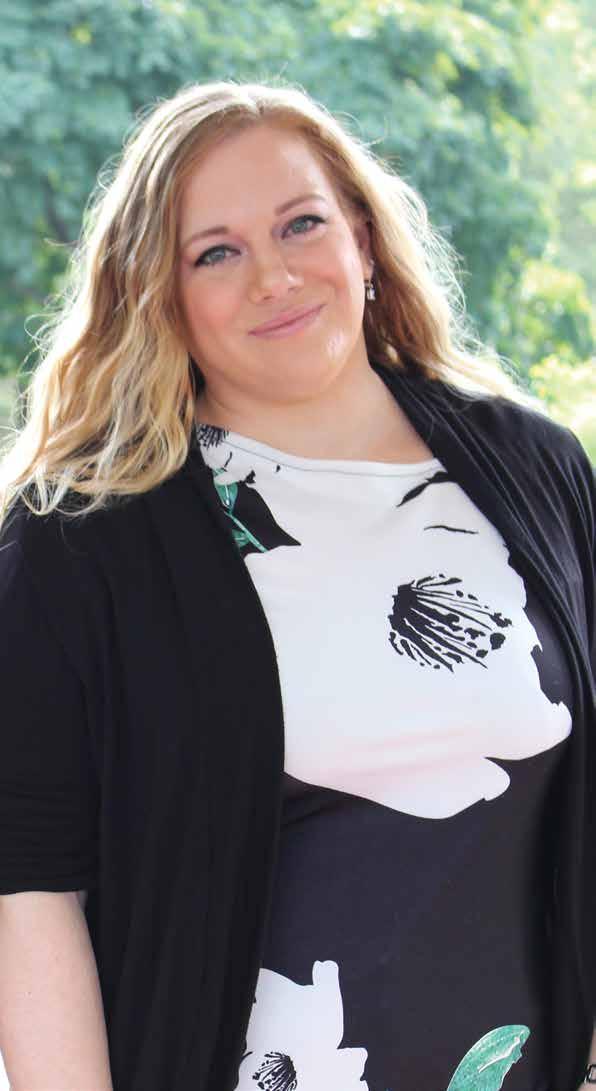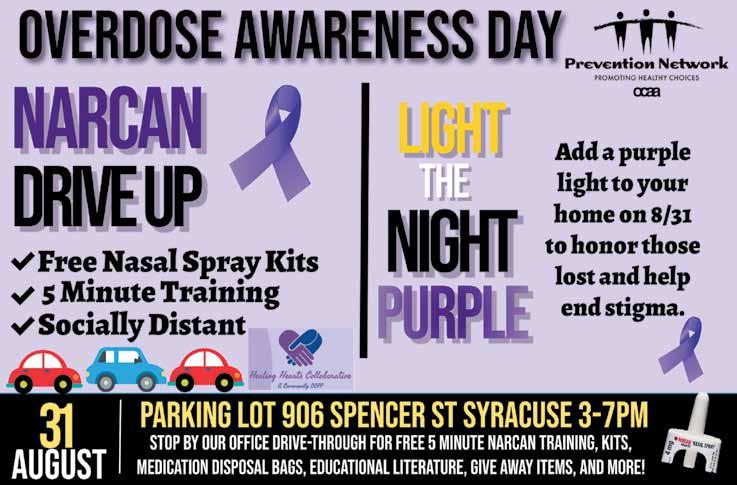
5 minute read
INSPIRE
The Long Road to Recovery By Emma Vallelunga
There is no specific road to recovery. Some people don’t recover at all. But those who look for help when they need it most are taking steps in the right direction. At Prevention Network in Syracuse, Ashley Dailey and Jessica Mozo use their own experiences with addiction to guide others away from a path they were glad they didn’t travel.
The Onondaga County treatment center provides support, services and opportunities to community members struggling with addiction and alcoholism. Jessica Mozo suffered from substance use disorder when her ex-husband was injured at work and became addicted to the painkillers he was prescribed by his doctor.
“I had wisdom teeth problems, and I started taking it too,” she said. “Sooner [rather] than later, the prescription wasn’t enough. We started buying pain medication, and then money wasn’t enough, so we started taking money from the place we worked.”
The theft landed her a minimum two-to-seven year prison sentence, but while in jail, Mozo was enrolled in Shock Incarceration, one of New York State’s toughest boot camps for young non-violent offenders.
Convicted felons within Shock are given strict military regimens with a focus on substance abuse education. The program is designed to provide an environment that teaches involvement, self-direction and individual responsibility.

Photo by Nancy Miller
Those who successfully graduate from Shock can shave months or even years off their sentences. Mozo spent six months in the program before being released on parole in 2013. After that, she made a decision.
“I knew that I needed to get a job. I knew that I needed to get an apartment,” she said. “I was living in a boarding house for about three weeks after I got out.”
With a little help from On Point for College, she continued her education. She received her bachelor’s at Onondaga Community College and SUNY Empire last year and worked at Sutherland Global Services for five years before Prevention Network. Mozo is now in training to become a certified substance abuse counselor and works as prevention educator and media coordinator for the organization. Because of the alcohol and substance use disorder treatment classes she was required to take through Shock, she realized education was the right career path for her.
“While I was in those classes, I thought this would be something I could do to try to help people,” Mozo said. “I have a felony, so it’s one of the professions you can have with a background like mine.”
Mozo was able to reconnect with her parents and three sisters, who ultimately supported her after her release. She hasn’t spoken to her ex-husband since, and she’s getting re-married to her current fiancé next month.
“It definitely took some time, but I think that everybody has been very supportive,” she said. “I had my family at my graduation, and I’ll have all my sisters at my wedding, but I do think there was a time in my life where that wouldn’t have happened.”
continued on page 32
But addiction comes in different forms. Ashley Dailey struggled with alcoholism. She said growing up, her father was a severe alcoholic.
“One thing I always grew up saying was I didn’t want to be like that,” Dailey said. “I didn’t want to be like him. Addiction runs in families, so I was cognitive of that growing up, but yet it didn’t stop me from ultimately taking the path to drinking and having to enter recovery on my own.”
When she realized she needed help, Dailey looked for support from other friends who were also in recovery to answer her questions and lift her up through a difficult time.
“They were like my light at the end of the tunnel,” she said. “I had an idea of what to anticipate as I went through the process.”
Dailey has been sober for four years. Her boyfriend is also a recovering alcoholic, and they live together with their 10-year-old daughter and eight-month-old son. When some days are harder than others, she said she and her boyfriend turn to each other to stay sober for their family.
“It’s nice in the sense that when I have those days where it’s more difficult than others, I can talk to him about that, and he understands where I’m coming from,” she said.
Their daughter is also aware of her past with alcohol, and Dailey said they’ve taken the time to educate her on the issue in hopes of preventing her from traveling down the same path in the future.
“I’ve been very open about it [with her],” she said. “If she ever finds herself in a place where she feels like she’s struggling, she can come to me, she knows it’s an open conversation, and it doesn’t have to be hidden.”
Dailey is currently earning her master’s in social work and continues to work at Prevention Network as a family support navigator. She believes her experience with alcoholism can allow her to see similarities and help others get back on the right track.
“There’s always something underlying that you can relate to, which is what I think makes me good at my job,” she said. “Even if our situations aren’t identical, I can empathize and understand where people are at in their journey.”
Mozo and Dailey remember dark pasts, but they both found brighter futures. They recovered in very different ways, but they believe recovery is possible for anyone struggling with addiction. All they have to do is work for it, no matter how long it takes.
“Recovery in itself is a life-long process,” Dailey said. “It’s not like a cold where you get sick, you take medicine, you get rest, you drink your water and then it’s gone. That’s not how it works. It’s something that someone has to constantly work at, but I think with the right support [systems] in place, anyone can recover. It’s one of those things you have to be mindful of all the time.” SWM











